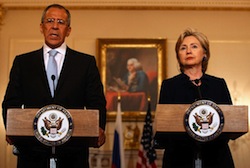Clinton Urges Russia to Finalize New START Agreement
February 24, 2010
Featured Image
We are happy to serve you a daily summary of the day's top nuclear policy stories each morning, with excerpts from the stories in bullet form.
Stories we're following today:
Clinton Presses Russia to Wrap Up START Deal - Reuters [link]
- Secretary of State Hillary Clinton phoned her Russian counterpart on Tuesday to press Moscow to wrap up final details on a new START deal to cut strategic nuclear weapons, the State Department said.
- Political analysts say a deal could boost strained ties between Washington and Moscow and emphasize their shared commitment to nuclear disarmament at a time when major powers are pressing Iran and North Korea to renounce their nuclear ambitions.
- Officials have indicated the most difficult disputes have been over verification measures, which Russia wants to be much less strict than under START.
- [P.J.] Crowley [State Department Spokesperson] said the United States believes that an agreement was now clearly in sight. "There are still some details to be worked out. We hope we can do that in coming days," he said.
McCain Could Help Obama Reduce Nuclear Threat - East Valley Tribune [link]
- In our view today, nuclear weapons threaten us more than they protect us.
- Their frightful power and lingering radiation make them indiscriminate and disproportionate weapons that would endanger innocent civilians. As clergy leaders in Arizona, we hold that life is most precious and that we have an ethical imperative to speak out in support of the movement toward nuclear disarmament.
- As residents of Arizona, we take particular note that McCain has associated himself with the goal. In a speech on the Senate floor earlier this year, McCain said, "let us keep in mind the dream of a nuclear-free world enunciated so eloquently by our 40th president."
- We hope that McCain will ultimately decide to support Senate ratification both of the strategic arms reduction treaty with Russia and of the Comprehensive Test Ban Treaty.
A Strategy for Iran - Council on Foreign Relations [link]
- David Albright, President of the Institute for Science and International Security, recently spoke with the Council on Foreign Relations on Iran's nuclear program, saying, "In a sense, the day of reckoning when Iran could make a decision to build nuclear weapons and carry out that decision relatively rapidly is fast approaching. I don't think it's 2010, but it could very well be 2011."
- Despite this timeline, Albright also spoke of difficulties: "One new development on the enrichment side is that the main enrichment site in Natanz has encountered problems and is not living up to the expectations that the Iranians tabled in 2006."
- "The administration has to focus on a range of strategies that essentially have to do with increasing the pressures on Iran through sanctions, through bolstering missile defenses, through building alliances with Arab countries in the region, learning to provide security assurances, and at the same time try to create structures to reduce the risk that these nuclear weapons capabilities will spread in the Middle East."
- "The other thing is, never give up. You don't accept Iranian nuclear weapons. It's very important that the administration make it clear that Iranian nuclear weapons are and will be unacceptable."
Obama's Diplomatic Strategy Working As Planned - Max Bergmann in the Wonk Room [link]
- There have been consistent assertions from conservatives and from the mainstream media that the Administration’s strategy of engagement was “naïve” and had “failed.”
- All of this overlooks the fact that the engagement policy is playing out just as Obama described. There are in fact increasing signs that UN security council sanctions, once seen as improbable, are becoming increasingly possible.
- What naysayers don’t seem to understand is that sanctions are a byproduct of engagement.
- While constructive talks that led to Iran renouncing nukes would have been ideal, engagement was just as much about building an international consensus and demonstrating to our allies and the world that Iran was the problem not America’s refusal to talk.
- UN security sanctions would put significant additional pressure on the Iranian regime, as it would highlight their international isolation and would clear the way for coordinated targeted sanctions against the regime. It would also be a big win for the Administration and would vindicate, not contradict, their strategy of engagement.
A View From the Dark Side
Obama's Obsession with Reduction - John Bolton in the Washington Times [link]
- Much of arms-control theology rests on mistaken premises whose consequences can be highly detrimental to U.S. national security interests.
- Squeezing down U.S. force levels is therefore not only a prescription for making America weaker, but for making its allies less safe and less confident in our ability to protect them.
- The impending U.S.-Russia treaty is only the start of the arms-control renaissance. Vice President Joseph R. Biden Jr. announced last week, for example, that the administration will push to ratify the Comprehensive Test Ban Treaty, which was defeated in the Senate in 1999. It hasn't gotten better with age.



